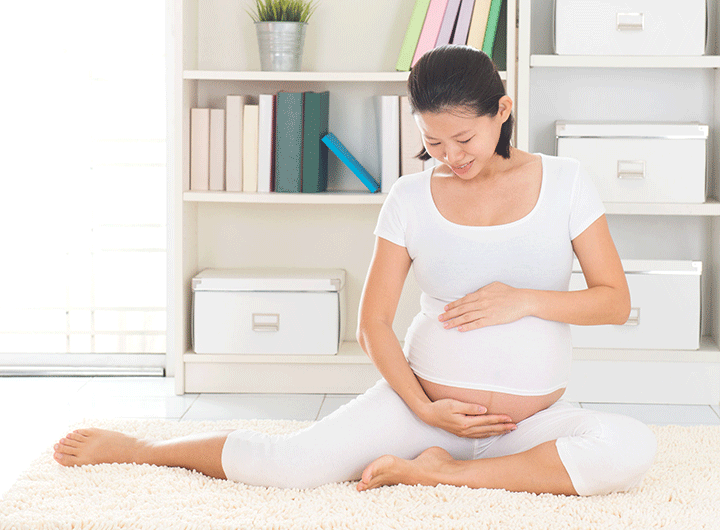Pregnancy Care
Exercising During Pregnancy: How Safe Is It? (Featured on Channel News Asia)
Medically reviewed by Dr. Choo Wan Ling

It is important for expectant mothers to keep active and fit during pregnancy. As your baby grows, you will need to be able to support the increasing weight as well as maintain the stamina to go through actual labour itself. Exercise also helps to reduce the risk and severity of gestational diabetes.
However, exercising should be something enjoyable for you. If it comes to a point when you are not enjoying it or starting to feel discomfort in any way, you should scale down or stop.
We will go through some common FAQs below:
1. What are some instances when a pregnant woman should NOT be exercising?
Contraindications to exercise: vaginal bleeding, risk of preterm labour, cervical incompetence, multiple pregnancy, known low lying placenta. Also avoid exercise if you have any pre-existing medical conditions that will bar a pregnant woman from exercising.
2. For those who have no pre-existing issues, and can participate in workouts, what do they need to be careful about, when they exercise?
During pregnancy, the body anatomy is different and ligaments soften due to the pregnancy hormones. Mums must be careful not to over stretch or have sudden movements that may cause ligament injuries. Balance is also an issue.
Remember to go easy on yourself. The aim is to maintain fitness, not to attain new fitness levels.
3. Taking all that into consideration, what are the types of activities that will be suitable for expectant mothers?
Aerobic fitness (for cardiovascular fitness) and resistance exercises ( for flexibility and strength training).
Generally advise avoiding exercise in first trimester for women who have been sedentary all this while (not for any medical reason but generally anxiety during the first trimester with regards to miscarriages and most women don’t feel so well during that phase to exercise as well)
- Aerobics – low impact, brisk walking, slow jogging (for women who have been jogging before), stationary cycling, elliptical trainer, swimming.
- Resistance Training – (using light weights, or resistance bands) to tone up lower limb muscles (squats with support), upper arm (biceps, triceps, deltoids. Inclined push ups (chest) toning, Pelvic floor exercises highly recommended.
- Gentle Stretching – bearing in mind that ligaments are more lax. Slow gentle stretching movements instead of sudden jerks. Eg stretching of inner thigh muscles, hamstrings, quadriceps. Stretching of back muscles especially useful due to lumbar lordosis in pregnancy.
Latest Articles
How Are Abdominal Hernias Treated?
What to Expect from Colorectal Surgery
How to Treat Breast Inflammatory Conditions
Gynaecomastia: Understanding Male Breast Cancer
4. And for that matter, what types of workout should they NOT engage in?
No contact sports, scuba diving, high speed sports like skiing. Also avoid abdominal crunches, dead lifts or any exercise in a supine position.
5. As baby grows bigger, and expectant mothers become heavier, understandably, the exercises should differ in intensity and duration, shouldn’t they?
The intensity of the exercise may need to reduce depending on how they feel. Remember, it should be about maintaining some fitness not attaining new levels).
Instead of brisk walking, walking might be good enough or even a slow stroll in the evening.
Ideally exercise for 30 minutes. At least 3 times per week. Heart rate should be 60-90% of maximal heart rate or RPE 4-5 (can converse comfortably or can converse but requiring a little effort).
6. What other factors should be considered as well, before an expectant mother starts an exercise regimen?
Keep exercise to 30 minutes and in an environment that is not too hot. It is a good idea to get clearance from your doctor to make sure you are fit for exercise.
7. For a pregnant woman engaging in exercise, what are some warning signs that she should stop her workout immediately?
Exercise should be enjoyable for you. Stop if you are feeling abdominal discomfort, too uncomfortable, breathless, faint or nauseous.
Also stop immediately if medical issues like vaginal bleeding or leaking liquor, preterm contractions arises.
If you feel pain from the exercises, it could be overstretching of ligaments or muscle injury. Stop and allow pain to disappear before resuming carefully. If it is not because of ligament injury, you can continue with stretching/flexibility exercises. Prenatal yoga is a great option.
8. What are some common myths / misconceptions that discourage pregnant women from exercising? What contributes to this false sense of insecurity?
The common myth or fear is that exercising can cause miscarriages or early delivery, which is not true. However many women choose to not risk it unless if they really enjoy exercising, especially if family and most friends around are advising against it.
Read this next ...
WHO WE ARE
关于SOG
新加坡O&G有限公司(SOG)成立于2011年,我们的愿景是创立一个专业的医疗和外科团队,从而满足现代女性及其孩子和家人的医疗保健需求。我们的诊所遍布新加坡各地,女性和儿童能够方便地享受我们高质量和值得信赖的个性化医疗保健服务。
- 产科
- 妇科
- 妇科肿瘤
- 乳房和普通外科
- 皮肤科
- 儿科
Recommended Obstetricians





